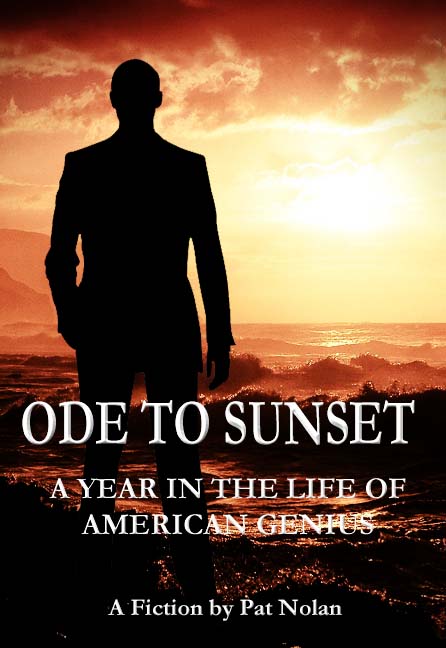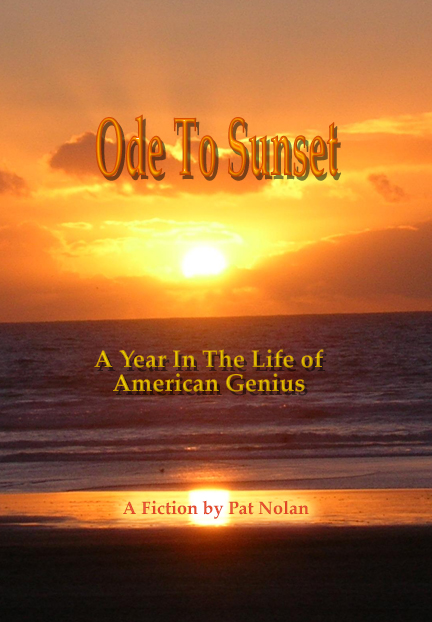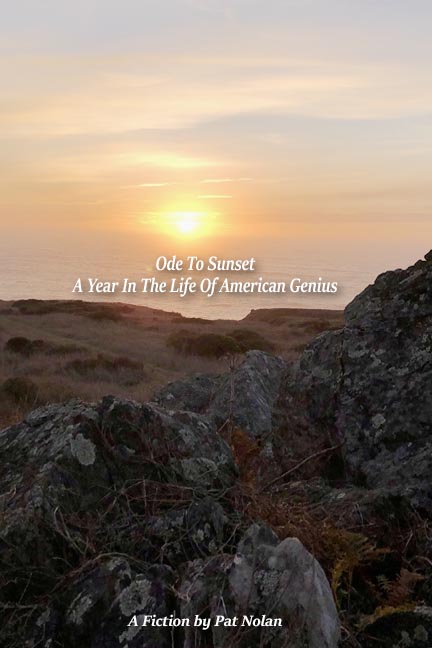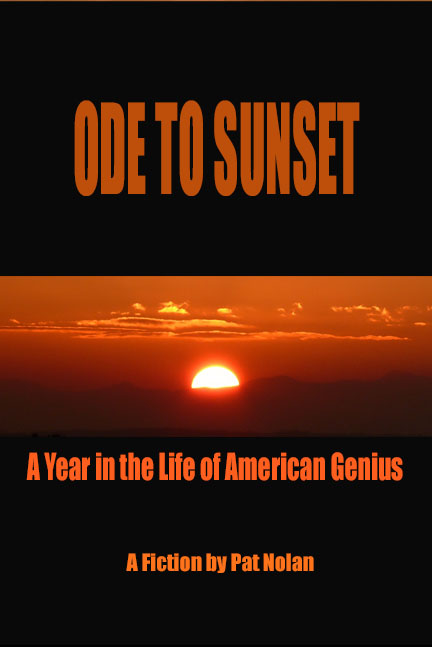
From the beginning, Ode To Sunset, A Year In The Life Of American Genius, was conceived as a narrative compendium of contemporary poetry through the sensibilities of a dying breed: the neo-Romantic, post-Beat, unaffiliated, uncompromising, anti-social poète maudit, Carl Wendt. In this fiction awash with recurring commentary on poets (dead or alive), their “craft and sullen art,” as well as their contentious milieu, there are four specific literary appropriations that relate thematically to the overall development. Ted Berrigan’s “People Who Died” places emphasis on death and dying as the title Ode To Sunset would imply. Guillaume Apollinaire’s “Lundi, rue Christine” illustrates the poet’s (and the author’s) willingness to appropriate the quotidian at its most mundane and trivial in the making of a poem (and a fiction) in the neo Modern model. Charles Baudelaire’s prose poem “The Eyes Of The Poor” from Paris Spleen turns on the idea, in Baudelaire’s words, of “feminine impermeability” or a particular intransigence, to reference a cold hearted Muse as well as anti-poet Carl Wendt’s equally bad luck with women. Frank O’Hara’s “True Account of Talking To The Sun” reinforces the romanticized Apollonian view of the poet as solar hero (i.e. a god) but is here repurposed as a brutal critique of Wendt’s work, itself an “ode to sunset.”

As flaneur cum poet living mostly by his hustle (much like Henry Miller in Paris), Carl Wendt has arranged regular weekly dinner engagements with patrons and friends. In this case, it’s Monday evenings with editor, publisher, and éminence grise of the San Francisco literary scene, Dorian Pillsbury. Dorian is on oxygen just waiting for death’s door to open and let him in. Naturally, the conversation turns to people who have died.
∴
“Walker Klein drank himself to death you know.”
“Yeah, I know, I watched him do it. Towards the end there, he was just a fucking zombie. I saw Henry Longtree the other day, same fucking thing, bleary eyed into the sunset.”
“And Odell Corcoran. Again, not altogether unexpected.”
“That surprises me. I thought she had it going on. Once she stopped the lesbian superwoman posturing, she showed she had some interesting stuff.”
“You’re thinking of Adele Cochran. Odell was that handsome black poet from Jamaica. He was always in such demand.”
“As a poet?”
“Not as much. And then after he got sick, not at all. He could have single-handedly wiped out the entire poet population in New York City. Fortunately, they are not all tramps.”
“And around the holidays, Khalid Bradica.”
“The guy was almost a hundred. I think even he was beginning to think he was immortal. His last words were something to the effect that he wanted to be buried like Frederick the Great.”
“With his five dogs?”
“Actually, I think with his five ex-wives. They were understandably not amused.”
“Carl, you’re making that up.”
“I hear he choked on a chocolate covered cherry.”
“Perry Lowery and Cliff Velez, a double suicide. I suppose the correct term is murder suicide. Cliff was such a talented photographer. He’s the one who photographed Roger for the portrait in the hallway. And Perry. Wasn’t he just rage and resentment personified? He was short listed for the National Book Critics Award. And the fact that Shaundra Eun won put him into a tail spin.”
Wendt grunted, sucking a thread of mignon from between his incisors. “Art is indifferent to our expectations.”
“It’s been five years since Robbie Hadley went off the deep end.”
“That reminds me. Chuck Lazar. I heard it from Digger who had it from his ex.”
“Oh yes, one of the Oakland people. That was some time ago. Didn’t they call themselves the California Pretenders? He was one of the better ones. And Laura Villalobos.”
“Whom I made the mistake of referring to as Laura Villabozos.”
“I seem to remember that story making the rounds.”
“I was young and in love with myself.”
“Yes, Carl, you’ve remained remarkably youthful in that respect.”
“Is she still prowling the literary salons? She was quite the cougar in her day.”
“Laura? I have a recent message on my answering machine from her. She is quite alive, and all claws.”
“Did you know Grady O’Grady?”
“Funny you should mention that name. I just heard about it today. What was it? Ran the car in the garage?”
“Asphyxiation is just not a way to go,” Dorian wheezed for emphasis, “I can assure you.”
“I’d never heard of him before.”
“He was associated with that Cambridge set who call themselves The Neo-Brahmins.”
“Ok, Michael Harry, Bridgette Smiley. The Reverse Review. That group.”
“Actually, that’s the Revere Review, after the famous New Englander. Mark Oldham called them ‘the British are coming’ gang in his article on the Boston literary scene in Book Forum. To which he could have added, ‘Too late! They’re already here!’”
“Where was Revere in the 60’s? We could have used him then. Herman’s Hermits?”
“Ever hear of a kid by the name of Ian Blake?”
“Certainly. He just won the Lambert Award. I was on the committee that recommended him.”
“He died in a vehicle accident?”
“Tragic, yes. And such a promising young writer. The car he was driving went out of control and swerved into a brick wall. He was killed instantly.”
“How about this guy Morgan Tilson?”
“I learned about it just this morning from Julie. Another fine poet. And a Lambert Awardee as well.”
“So what does the Lambert prize consist of these days, a bag of cash and a one-way ticket on the ferry across the river Styx?”
Dorian strained at a low coughing laugh, it was about all the air he could allow himself, and raised his glass in salute. “Poets are dying every day. What’s killing our poets?”
Wendt was reminded of Jeremy’s conspiracy theory. “Maybe it should be ‘Who is killing our poets?’”
Wendt cleared the table, retrieved the bottle of port from the cabinet in the sideboard, and poured two glasses. It’s what they did on Mondays after dinner. Wendt would recount the salient details of his previous week: whom he had met, insulted, what literary events and art shows he had attended, and what books he was reading. Currently it was a fascinating book titled Out Of Pangaea, about the evolution of the South American tree mole with implications on early hominid development.
Dorian let Carl do the talking. It saved his breath. Dorian for his part would enumerate the celebrities he had known in his day and invariably this led to a list of the dearly departed.
“Ted. Well before his prime.”
“Same with Jack. In Florida, the elephant graveyard of French Canadians.”
“Frank, of course. Such a shame. And Jimmy. Ken, too.”
Wendt made a mental game of anticipating who he would name next. Robert, Ron, Allen, Tom, Michael, Sean, Phil, Martin, David, Victoria, Jeffrey, Lindsey, Hunce, Darrell, William, Mort, JC, Jerry.
“Paul.”
“Blackburn?”
“Of course.”

After being released from the hospital where he’d landed when a recent paramour’s husband caught up with him and vehemently expressed his displeasure, Wendt has succeeded in making himself an unwelcome guest at Courtney Larouche’s cute little historic alleyway bungalow where he is ostensibly recuperating and getting on everybody’s nerves which makes it imperative that he accommodate his idling elsewhere. Again, it’s a Monday.
∴
In his convalescence, he’d also grown fond of Rude Christine’s, a cybercafé off of Fillmore in the vicinity of Japantown.
It was a Monday, he remembered. He had passed the time surfing the web, jotting in his word file stray bits of conversations, making observations:
“The manager and her mother will let anyone in. Are you man enough to do it? Someone has to guard the door while the other one goes up.”
Three gay cocks lit blue as gas flames. The owner has a chest condition. “When you get done, we’ll play backgammon.” The lead singer from an old seventies punk band has a sore throat.
“If you fall by Tuni’s, I’ll turn you on to some tuies.”
Kinda rhymes.
Stacked saucers, flowers, a Cubist era style calendar.
“I owe damn near 300 large on my rent. I’d just as soon cut off my nuts as give it up.”
“I’ll be leaving at about half past eight tonight.”
Six mirrors always reflecting each other.
“I think we’re just getting deeper in shit.”
Dear Sir, you are a lousy crumb (in response to a negative review – the irony perhaps too subtle.)
That woman has a nose like the tip of a sewer snake.
Louise forgot her fur. Me, I don’t need a fur nor am I cold. A guy known to everyone as Danny smokes a cigarette (outside) and checks the bus schedule. A black cat traipses across the brass rail.
“Those crepes were exquisite.”
On a cell phone. “Oh, didn’t make the MacArthur cut again this year? Yeah, me neither.”
The soda fountain trickles. Dress black as her nail polish. It’s completely impossible.
“Here you go, mister. Malachite ring.”
The floor sown with sawdust. The redheaded waitress took off with the bookstore clerk. A reporter I vaguely recognize from elsewhere.
“Listen, Jack, what I’m about to tell you is of the utmost importance.”
Passenger Cargo Manifest (art deco poster for a steamship line.)
“So he says to me, mister, would you like to see what I can do with etchings or oil? I’ve just got this little cutie.”
After lunch at the café on Steiner.
“Once there, he introduces me to some big shot who tells me, ‘look that’s all well and good, in Syria, Naples, Tunis, but good God, where is it’? The last time I was in China. Gotta be eight or nine years ago.”
Honor often arrives at the stroke of the hour (the beginning of her shift).
The upper hand (something he felt he had to gain).
And that was where one of Hugh Klidian’s associates had found him to tell him the good news.

Carl Wendt’s women troubles are exacerbated when he reunites with Mac, more enamored of the writer than the writing, who had been keeping her distance because she suspected that her husband was on to their liaison, and which coincides with the errant poet’s epiphany on Halloween at Enrico’s in North Beach (not a Monday in 2008). Also foreshadowed is the elaborate pun on a lyric from a Bob Dylan song. As well, Frank O’Hara makes a cameo appearance at the end. (Caveat lector: the narrative lapses into first person.)
∴
It was Halloween and the following morning of dia de los muertos should have found me dead. That was when I came to hate her. It was then I understood Mac to be the most perfect example of feminine impermeability in all existence.
We’d spent the long day together in the Castro as the colorful and often risqué carnivalesque swirl erupted from bars with drunken hoots and shrieks, parading down the streets in high, very high, fashion. And with hardly any chance to talk, to catch up, jollying and jostling with old friends and new acquaintances, my own celebrity but mostly her credit card keeping us well watered. It was an evening destined for excess.
“Listen grapenuts, I’d be gay but I can’t do the snappy finger thing.” And like a broken record, much to her chagrin I’m sure, “Some of my best friends are cocksuckers.” Someone in the group jammed a powder blue wig on my head and shouted in my face, “You’re just an old queen!”
Eventually we found ourselves on the terrace at Enrico’s, a table overlooking Broadway, costumed freaks and partiers parading by, the default costume being do-it-yourself zombie, smeared catsup on face and clothing and moving like imagined reanimated corpses might walk. A few chollos in their best orange and black walking their pit bulls followed by a bevy of transvestites dressed like they had just come from partying with the Sun King or returning from Cinderella’s Ball. Feathered nymphs and bare breasted goddesses exhibited themselves followed by a pack of male supplicants and slaves in leather. Teen couples drinking jello shots or sucking on alcohol laced sno-cones ventured into the orange neon haze and the shadow black of night dressed as adults, indistinguishable from adults, all history and all mythology exhibiting the seven deadly sins.
On the street directly in front of our table, a man of about fifty, drawn cheeks no makeup could affect, grey stubble swathing his jaw, had stopped to stare at us, holding by the hand a small boy dressed in outsized clothes, and carrying on his arm another small child held to his shoulder. He was a transient, maybe even homeless. The children’s rags were not costumes. Maybe he had taken them out to relieve the horrible monotony of their uncertainty and poverty. It wasn’t on my powder blue wig he had fixed his gaze, perhaps even wonderment, but at Mac’s purplish glowing light-reflecting red satin low cut dress that left nothing to the imagination. That and the pair of little red horns topping the liquid curls of her carrot tresses. The wicked smile was not part of the costume but it fit the occasion.
Song writers say that pleasure ennobles the soul and softens the heart. The song was wrong that evening as far as I was concerned. Even as I was touched by the haunting eyes of such desperation, I felt ashamed for the drinks we hoisted, too big for our britches. I turned to her, to catch her attention and convey a shared empathy. I looked into those green eyes, home of caprice and governed by the moon, as she said, “Those people give me the creeps.” And summoning the waiter, “Can’t someone do something about them?” So maybe hate is too specific a word for what I felt. Certainly disappointment.
For an instant I entertained the notion that I was looking at myself but in the past, and that those children were ours and I had finally found her after she had abandoned our marriage and left me penniless and caring for the kids. And it chilled me, that her disdain came so casually, so callously, that she didn’t realize that I was just a step away from them.

Approaching the hurried chaos of Ode To Sunset’s ending, the poet reestablishes his relation with the sun at the end of the day—as does the fiction which is organized with a narrative arc for day, week, month, and year. Carl Wendt find himself stranded on a Northern California beach far from his beloved Frisco, stoned on homegrown, ditto pain pills for his still healing leg fracture, and working his way through a six pack while the waves of the Pacific wash at his feet.
∴
He closed his eyes, heaved a great sigh, and settled back to view the abstract expressionist slide show. It was almost guaranteed to put him to sleep.
So dozing he dreamt that he’d awakened from a dream. A white horse was lying on its side in the sand. It had only one wing and was trying to rise, but was unable to. The sun was yelling, “Hey! Wake up! Don’t be so rude as to snooze in my presence. You’re only the second, no, make that the third poet I’ve chosen to talk to. So pay attention!”
“Pay Attention, wasn’t that the title of my first book?”
“Right, now is the time to put that into practice. You think I’ve got all day?”
“Sorry, I stayed up late last night talking with Patti.”
“The times I woke up Mayakovski and O’Hara, they were a little more appreciative. Anyway, I wanted to tell you your poetry sucks. Sorry that’s just the way I am—unfiltered through the niceties of rejection, so consider this your burn notice. I’ve seen a lot of poetry over the last couple of epochs and I have to say that yours has to be among the worst. The best I can say about you is that you’re different. I’ve also heard it said that you’re crazy but that’s generally been from those who have been lobotomized by Anglo hegemony. The real crazy poets, on the other hand, think you’re a boring reactionary and a sellout. Not that you shouldn’t sweat it, the heat on your credibility is bound to get hotter, and you’ll pay hell for ignoring it. People are always criticizing your poetry, that it’s either too smart or too dumb, too superficial or too obscure, too light or too ponderous, that the stanzas are too long or too short. And because you don’t publish every day, they say you’re lazy. Or dead. Don’t worry about your lineage, poetic or otherwise, it’s never been anything to brag about and now it’s practically non-existent. Maybe you should reconsider trying to cast your pathetic poetic light on everything from sea to shining sea, on the jungle, on the tundra, on the city, on the farm, the mountains and valleys, and most of all, the frigid wastes of the human soul, now that you’ve come to the end of your days, so to speak. No one is ever going to read you. Not everyone can stomach your narcissism. It hurts their pride.”
“Ok, Sun, why are you telling me all this?”
“Remember I’m keeping an eye on you. It’s much easier for me to talk to you out here than it is in the city. I don’t have to slide down between buildings to get your attention. But you should try looking at more than the toes of your shoes, rejecting everything, people, earth, sky, stars, as you do, ungraciously and with your inappropriate claims to genius. That too is your inclination, known on high, and you should give it up, you’re not a track star from Mineola Prep. It’s the road to hell if you continue, and I don’t doubt that it will lead you there. If you’re lucky we’ll speak again when I return from the other side of the world. Go back to sleep now, Carl. I’m leaving this thought in that pointy little head of yours as my goodbye.”
“No, please don’t go just yet. I have so many more questions.”
“No, go I must, they’re calling me.”
“Who are they?”
“You’ll never know. They won’t be calling you, that’s for sure.”
Darkly the sun began to set, and darkly he awoke.
Ode To Sunset, A Year In The Life Of American Genius, follows the peripatetic (some might say priapatetic) footsteps of a lumbering literary dinosaur from the early awakening of one day to the twilight of a year later, detailing activities of a typical week as well as those of the months that make up the life of American genius. The terrain the poet traverses in these pages is an allusive ambiguous tangle of metaphoric similitude that comprises the basis for literature. To be clear, Ode To Sunset is not a roman á clef nor is it autofiction. Names, characters, places and incidents are products of the author’s imagination or are used fictitiously. Any resemblance to literal events or locales is entirely coincidental. As well, no actual poets were named in the writing of this fiction with the exception of dead poets who serve as historical or literary markers as is often required of dead poets. But don’t let that stop you.